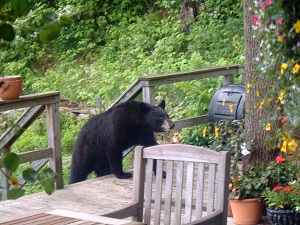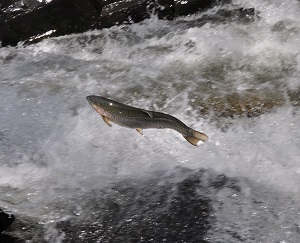Vermonters are Seeing Increased Bear Conflicts with Late Spring
MONTPELIER,
Vt. – Black bears have arisen from their winter slumber and are once again
roaming the landscape looking for food. The late spring is delaying the
growth of bears’ natural food sources, which is likely contributing to a rise
in bear-human conflicts this year according to Vermont Fish & Wildlife bear
biologist Forrest Hammond.
Hammond is
asking the public to help keep Vermont’s bears wild by removing any potential
food sources that would cause them to associate people with food. “Bears will
be more attracted to people’s yards than normal this year as they struggle to
find foods in the wild,” said Hammond. “This presents an even more urgent need
to keep bears and humans safe by removing bird feeders and securing garbage and
other potential bear attractants.”
Hammond
offers a few simple tips to avoid attracting bears:
- Remove
food sources that might attract hungry bears. These include pet food,
barbecue grills, garbage, compost, and campsites with accessible food and
food wastes. Birdfeeders are one of the most common bear
attractants, so remove all birdfeeders and clean up seeds beneath them.
- Store
garbage containers in a garage, shed or basement, and put your garbage out
the morning of pickup rather than the night before.
- Consider
installing electric fencing, a cheap and effective deterrent to bears,
around dumpsters, chicken coops, berry gardens, beehives or other
potential food sources.
- Maintain a compost bin that is as scent free as
possible by adding three parts carbon-rich ‘brown’ materials like dry
leaves, straw, or ripped up paper for every one part food scraps or
‘green’ materials. Turn the pile every couple of weeks and bury
fresh food scraps down in the pile to reduce their attractiveness.
In backyard composters, avoid composting meat, dairy, or overly smelly
foods.
- Keep
a respectful distance from any bears you encounter. If a bear is up a tree
near your home, bring your children and pets inside. Never approach
bear cubs or attempt to ‘rescue’ them if you find them alone. If you
see a bear in a residential area or you encounter an aggressive bear,
please contact your local warden or report the bear at
vtfishandwildlife.com.
Residents
are required by law to remove bear attractants and are prohibited from killing
problem bears without first taking extensive nonlethal measures.
For
Immediate Release: May 3, 2018
Media
Contacts: Forrest Hammond, 802-777-7493


